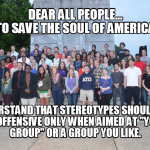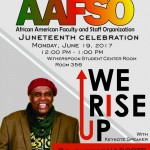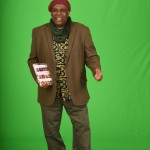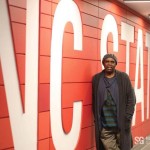About a month after receiving the Chancellor’s call and letter, I received official notice from the UNC-System Board of Governors. Now I could tell my colleagues, students, the whole campus. Starting in the just past Fall semester, I had been working very closely with the editors of the Technician. In fact, already this Spring-semester, those editors had published one of my guest columns, “A wake up call to neo-diversity gumbo.â€
 The Technician
Posted: Friday, February 1, 2013 12:11 am
Rupert W. Nacoste, Ph.D., Guest Columnist |
    I am a Louisiana black-Creole from the bayous. Just think swamps, alligators, crawfish and gumbo and you get the right picture, and if your imagination is really good, the right smells.
    Delta Upsilon Fraternity had a gumbo gathering on Jan. 16. One of their member’s families is from Slidell, La. and he made gumbo. With his gumbo, he represented my “…who dat†nation very well.
    So no, I didn’t cook. I was there to lead a discussion of neo-diversity. You see, we no longer live in a society where our racial contacts are controlled and restricted by law. Not only that, but nowadays, every day, on the N.C. State campus each of us has some occasion to interact with a person from another racial, gender, ethnic, religious or sexually oriented group. That’s true all over the United States.
    Using some words of Dr. Martin Luther King, Jr., I introduced the idea of neo-diversity and got the fifty-five or so students talking. To help our fellow Wolfpackers understand how much and how fast things have changed I let them know that I, a dark-skinned black man, grew up in the Jim Crow South – that time of legal segregation and legally supported bigotry. We have gone from that to neo-diversity where our racial contact and interactions are not controlled by law or anything else. We have gone from that to the second inauguration of a black, racially-mixed man: President Barack Hussein Obama.
    This neo-diversity has come to America quickly. That is causing some people to panic and try to avoid everyday social interactions on our campus. So, I challenged the students to learn to interact across the superficial group lines. Learn now because when you leave this campus, employers are looking for people who can do that. But learn it now, I said, because everybody here at NCSU is Wolfpack.
    WOLF! PACK!
    Though it’s fun, that cheer is empty if you don’t mean everybody on our campus. Wherever we are in America, we have to learn to interact with each other as individuals, not as representatives of a group. If you try to interact with someone as a representative of a group, that interaction will go bad because your strategy will require that you rely on stereotypes. And no person is going to respond kindly when they feel you aim a stereotype at them. In this age of neo-diversity we all have to learn to interact with the person standing in front of us and not with our ideas about the group.
    That night at Delta Upsilon I felt good because everybody seemed to be willing to engage in dialogue and take on new thoughts. For an hour we had a good time, but I had to bring things to a close because my old knees were telling me to go home.Â
    Many students came up to me to thank me for coming, talking and making it fun. One young white woman was struggling to find the words to thank me. “Thanks,†she said, “that was…that was…†Someone else standing there said, “…compelling.†The young woman who was struggling shook her head and said, “…no…yes it was that…but it was…a wake-up call.â€Â
    That’s why I give talks and presentations about neo-diversity. I do what I can to get every audience to wake up and see our neo-diverse America. I want everyone to wake up to the fact that America just ain’t what it used to be. I want all of us to wake-up, acknowledge and appreciate our wonderful, American neo-diverse gumbo.
   *****
    Given my strong relationship with the editors, with a copy of the Board of Governor’s official letter I sent word to the editors of our school newspaper The Technician. I was blown away by the editorial they wrote that week. Part of what they said was:
    In addition to his academic achievements, Nacoste is a strong supporter of civil rights and social justice. His research on interpersonal relationships and modern racial tensions has led him to publish multiple essays on what he calls “neo-diversity.†His classes, often called tough or intense, include his thoughts on the false claim that we live in a post-racist United States, and he challenges his students to confront prejudice on campus and within their personal lives. He seeks to genuinely educate students about these tough topics.
    “Wherever we are in America, we have to learn to interact with each other as individuals, not as representatives of a group,†Nacoste recently wrote in a guest column in Technician.
     “If you try to interact with someone as a representative of a group, that interaction will go bad because your strategy will require that you rely on stereotypes.â€
    We greatly respect Nacoste and completely support the Board of Governors in their decision to recognize him with this award. He is a model of both academic excellence — through the respect he garners from students — and civil rights activism — through his willingness to promote diversity and thoughtfully discuss hard topics.
   So Nacoste, this goes out to you. Who Dat?
Wow!





